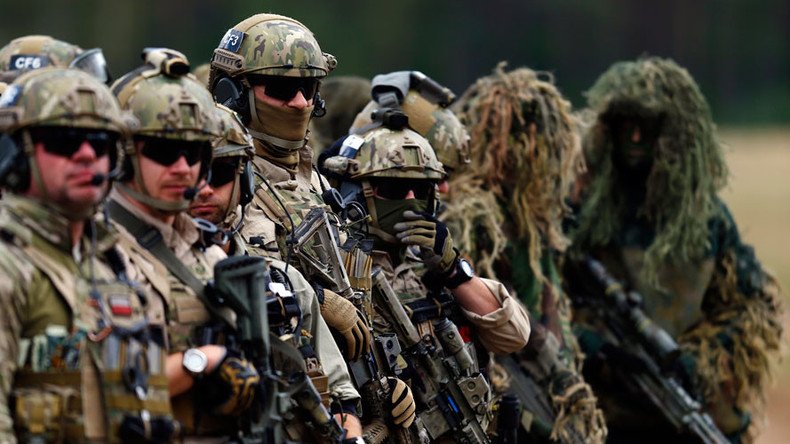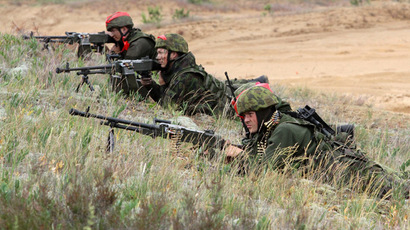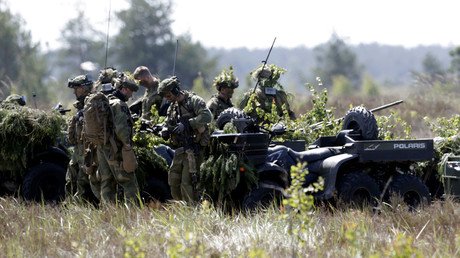Poland must target Kaliningrad, Moscow Metro & RT to deter Russian invasion – think tank

Russia is unpredictable and may attack the Baltic states and Poland at any moment, so Warsaw should strengthen its military and be prepared to hit the city of Kaliningrad with missiles and shut down RT, a think tank with close ties to NATO has said.
Called ‘Arming for Deterrence’, the 25-page document released by the US-based Atlantic Council says what NATO in general and Poland in particular should do to “counter a resurgent Russia.” The threat of such an attack is imminent, the report states.
“Even if Moscow currently has no immediate intent to challenge NATO directly, this may unexpectedly change overnight and can be implemented with great speed, following already prepared plans. The capability to do so is, to a large extent, in place,” the report warns.
The council says a Russian invasion cannot be predicted as it could be triggered by anything from NATO being “distracted by another crisis” to Moscow’s “misperception of NATO’s activities and a miscalculation of the Alliance’s resolve.”
While being unpredictable, “Russia rarely disguises its true intentions,” according to the report. “On the contrary, it has proclaimed them very publicly on various occasions, but, in general, the West has chosen not to believe Russia’s declarations and disregards its willingness to carry them out.”
If Russia does invade, the alliance would be slow to respond, and Russia would try to achieve a fait accompli and use nuclear deterrence to prevent a full-scale war. The goal of Poland as the biggest NATO member close to Russia would be “to delay and bog down an invading force and inflict unacceptable damage on it,” according to the Atlantic Council.
“[NATO] force [in Poland] is not required to win the war, but it must be able to fight alongside the host-nation forces to buy NATO more time for reinforcement. NATO’s presence in the region is currently not large enough to achieve this,” the report said.
READ MORE: NATO can’t fight Russians in Europe, says leading US think tank
Swift reforms are needed if Poland wishes to be able to deter Russia, the report says, suggesting a number of measures for Warsaw to take. Many of them are focused on the Polish military and involves strengthening its numbers and purchasing modern new weapons, such as the US-made JASSM aircraft-launched cruise missiles, which could hit targets deep inside Russia, or the coastal NSM missiles, which can be placed in range of the Russian city of Kaliningrad.
Poland should also procure more multiple rocket launchers, attack helicopters, UAVs and other weapons, the report adds. These efforts would require streamlining the procurement process so that purchases were not stalled by Polish red tape, the report suggests.
All this spending would not allow Poland to withstand the hypothetical Russian onslaught, the report says, so the country should prepare its military for a guerrilla war by building a network of shelters in its wooded areas.
“This shelter or bunker network, built with significant redundancies, would facilitate the deployment of ‘stay behind’ units. Poland’s military tradition in forest-based guerrilla warfare dates back to the 1830s. More recently, forest units resisted the Germans and Soviets from 1939 to the 1950s,” the council said.
Poland should also make several policy statements, according to the think tank. It should “aim to join the tactical nuclear capability scheme within NATO, so enabling its F-16s to be carriers of tactical nuclear ordnance”. It should also announce targets for potential cyber offensive operations, “which could include the Moscow metro, the St. Petersburg power network, and Russian state-run media outlets such as RT.”
Other advice from the Atlantic Council includes undermining any efforts by the EU to create its own military force, as it would switch resources to it from NATO.
“Any weakening of NATO cannot be countenanced, especially at this political juncture, and particularly with a putative British exit from the EU weakening the Union’s collective military posture outside of NATO,” the report said.
Warsaw should also “find new incentives for its citizens to remain in Poland rather than emigrate to other EU countries,” the document said, adding that “Emigration has reduced Poland’s defense capacity by draining people of military age, often with the technical and information technology (IT) skills that Poland’s forces require.”
RT’s editor-in-chief, Margarita Simonyan was very much amused by the council’s advice to launch cyberattacks on RT.
“Ha! In case anything crops up NATO’s helpmates say Poland should go straight to cyberattacking RT. No kidding,” she said.
The Atlantic Council which “has close ties” with the White House and is “very tightly tied” with US national security is trying to “coast a Cold War mentality” which feeds on people who think that it is still 1975, political cartoonist Ted Rall told RT.
“You know it’s amazing. It’s been 25 years since the collapse of the Soviet Union […] but to many people in Washington who are reconstructed cold-warriors nothing ever really changed and they still view Russia as a nation that should be contained…” he said. “The problem for the world is that even younger politicians like President Obama are beholden to these ancient old cold-warriors who think it’s still 1975.”
Keeping the Cold War mentality in place is “big business” and is in the best interest of lots of companies in the US and around the world since there are “billions if not trillions of dollars at stake”.
“It’s just a scare-tactic. It’s fearmongering and the US intelligence community is very very good at it... If we, God forbid, ever lived in a peaceful world and in peaceful coexistence with other nations, God knows how many companies would go out of business in the United States and around the world,” Rall said.
“This is big business and there has to be a constant sense of fear and terror, otherwise, this whole infrastructure would collapse”.
READ MORE: Poor little NATO vs big bad Russia: a disinformation primer
Poland and the Baltic states are among the more vocal advocates of an increased NATO military presence close to the Russian border, saying it is needed to deter alleged Russian aggression. The alliance agreed at a summit in Warsaw earlier in July to place additional rotating troops and hardware in Poland and the Baltic States, as well as to step up naval presence in the Black Sea and the Baltic Sea.
Russia denies having any intent to attack NATO and says the alliance is trying to justify its existence by drumming up anti-Russian rhetoric. Russia considers NATO’s military buildup in Europe a threat to its national security and accuses the West of reneging on a post-Cold War promise not to enlarge the alliance towards Russia’s borders.














